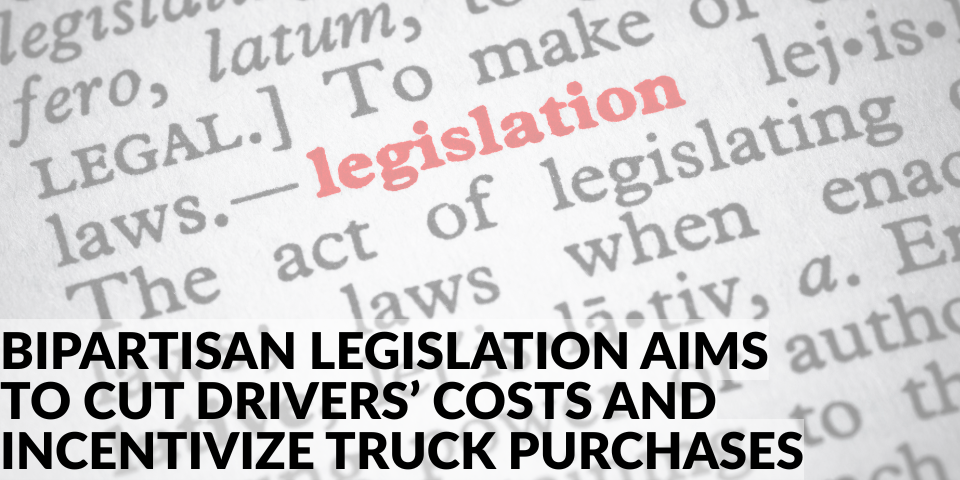In The News

Bipartisan Legislation Aims to Cut Drivers’ Costs and Incentivize Truck Purchases
See what happens when we just try and get along?!
House lawmakers have recently reintroduced bipartisan legislation aimed at easing financial burdens for truck drivers and incentivizing new entrants into the trucking industry. U.S. Representatives Pat Ryan (D-N.Y.) and Zachary Nunn (R-Iowa) introduced the Strengthening Supply Chains through Truck Driver Incentives Act last week, offering significant tax credits for both current and aspiring truck drivers.
Additionally, a coalition of five congressmen, led by Representatives Doug LaMalfa (R-Calif.) and Chris Pappas (D-N.H.), proposed the Modern, Clean, and Safe Trucks Act of 2025, which seeks to repeal the 12% federal excise tax (FET) on new truck and trailer purchases.
Both legislative proposals have been introduced in previous congressional sessions but failed to advance. Lawmakers and industry stakeholders emphasize that these measures are crucial for bolstering the trucking workforce, addressing supply chain challenges, and making truck ownership more accessible.
Incentives for Truck Drivers
The Strengthening Supply Chains through Truck Driver Incentives Act is designed to provide tax relief for truck drivers, encouraging retention and recruitment in an industry critical to national commerce. The proposed legislation includes:
- A refundable tax credit of up to $7,500 for tax years 2025 and 2026 for truck drivers holding a valid Class A Commercial Driver's License (CDL) who log at least 1,900 hours annually.
- A refundable tax credit of up to $10,000 for tax years 2025 and 2026 for new truck drivers or those enrolled in a registered trucking apprenticeship program.
- Eligibility for new truck drivers even if they did not operate a truck in the previous year. Those who log at least 1,420 hours in the current year would qualify for the full credit, while those driving fewer hours could receive a prorated credit based on their weekly average.
Rep. Ryan emphasized the importance of these incentives, stating, “Passing this bill is a no-brainer: better conditions for the workers that drive us forward, more high-paying union jobs, and lower costs for families across the country.”
Rep. Nunn highlighted the critical role of truckers in maintaining supply chain stability, adding, “We have to be encouraging more people to sign up to drive and stay there, which is why providing incentives like this is so important. Keeping more skilled drivers on the road will also help combat supply chain issues, which jack up prices for American consumers.”
Repealing the Federal Excise Tax
The Modern, Clean, and Safe Trucks Act of 2025 seeks to repeal the FET on new truck and trailer purchases. The tax, originally introduced in 1917 to fund World War I, is now the highest-percentage federal excise tax imposed on any product, costing the trucking industry an estimated $6 billion per year.
The American Trucking Associations (ATA), which supports both bills, argues that the FET disproportionately affects small trucking businesses that have limited access to capital. “In many cases, this exorbitant additional expense simply puts new trucks out of reach, and small businesses with less access to capital are disproportionately harmed,” the ATA stated in a press release.
Beyond the financial impact, the ATA stressed that retaining the FET discourages investment in newer, safer, and more environmentally friendly trucks. “Keeping this tax on the books decreases orders for trucks and trailers, consequently reducing manufacturing jobs. It also delays the deployment of new trucks and trailers, which have greater environmental and safety benefits compared to older models still on the road,” the association noted.
A Path Forward for the Trucking Industry
Both legislative proposals represent a concerted effort by both parties to strengthen the trucking industry, which is vital to the U.S. economy. By offering financial incentives to truck drivers and removing burdensome taxes on new trucks, lawmakers aim to increase workforce participation, enhance safety, and modernize trucking fleets nationwide. While past efforts to pass these measures have stalled, the renewed bipartisan support suggests a growing recognition of the industry’s challenges and the urgent need for solutions.
